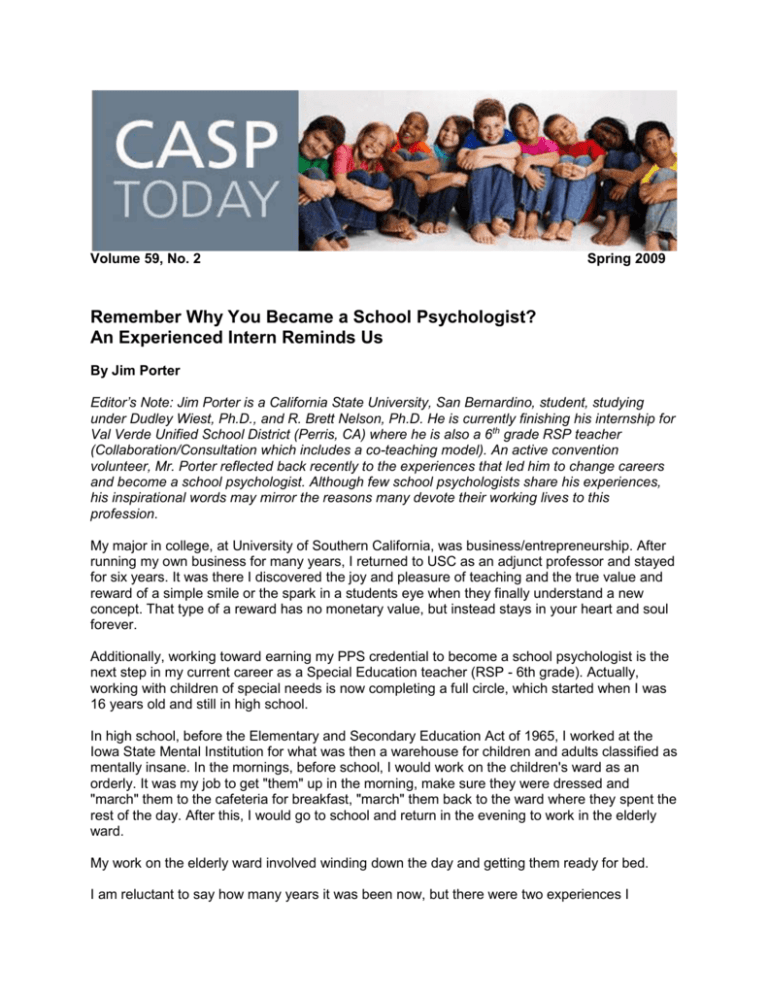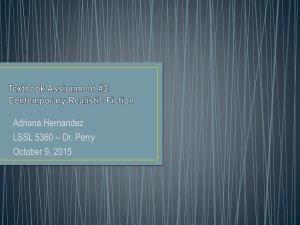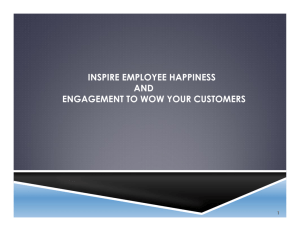Remember Why You Decided to be a School Psychologist
advertisement

Volume 59, No. 2 Spring 2009 Remember Why You Became a School Psychologist? An Experienced Intern Reminds Us By Jim Porter Editor’s Note: Jim Porter is a California State University, San Bernardino, student, studying under Dudley Wiest, Ph.D., and R. Brett Nelson, Ph.D. He is currently finishing his internship for Val Verde Unified School District (Perris, CA) where he is also a 6th grade RSP teacher (Collaboration/Consultation which includes a co-teaching model). An active convention volunteer, Mr. Porter reflected back recently to the experiences that led him to change careers and become a school psychologist. Although few school psychologists share his experiences, his inspirational words may mirror the reasons many devote their working lives to this profession. My major in college, at University of Southern California, was business/entrepreneurship. After running my own business for many years, I returned to USC as an adjunct professor and stayed for six years. It was there I discovered the joy and pleasure of teaching and the true value and reward of a simple smile or the spark in a students eye when they finally understand a new concept. That type of a reward has no monetary value, but instead stays in your heart and soul forever. Additionally, working toward earning my PPS credential to become a school psychologist is the next step in my current career as a Special Education teacher (RSP - 6th grade). Actually, working with children of special needs is now completing a full circle, which started when I was 16 years old and still in high school. In high school, before the Elementary and Secondary Education Act of 1965, I worked at the Iowa State Mental Institution for what was then a warehouse for children and adults classified as mentally insane. In the mornings, before school, I would work on the children's ward as an orderly. It was my job to get "them" up in the morning, make sure they were dressed and "march" them to the cafeteria for breakfast, "march" them back to the ward where they spent the rest of the day. After this, I would go to school and return in the evening to work in the elderly ward. My work on the elderly ward involved winding down the day and getting them ready for bed. I am reluctant to say how many years it was been now, but there were two experiences I remember as clearly as if it were a video playing in my mind at this very moment. One involved a 7-year old boy. His name was Timmy Williams (pseudonym). Each morning Timmy would get up and, like a little puppy, follow me on my rounds. To me, I could clearly see there was a physical and cognitive difference between Timmy and the other children on the ward; however, I could never figure out why Timmy was there. One day I asked the duty nurse what was wrong with Timmy and why he was a patient in the mental institution. Much to my surprise, I was told Timmy had a degenerative spinal cord and was not expected to live past the age of 10 or 12 and, for that reason his parents did not want him at home. At that moment I learned, for some people, a child's life is simply an inconvenience, has little value, and can be thrown way like the trash! The other experience was on the elderly ward. One evening, as I was standing in the middle of the ward, I felt someone pounding on my back. Being a 16-year old orderly, dressed in my white uniform with black shoes, black belt, and "KEYS", I felt important and had no fear. As I turned, what I saw was an elderly man with stringy white hair, wire rimmed glasses, who stood about 5-feet tall and continued to pound on my chest with both fists. As he pounded, he was yelling: "You never pay attention to us. You look through us like we are made of glass. The only difference between you and us is YOU GET TO GO HOME AT NIGHT!" He was correct, I did not show any compassion for them nor did I indicate they had any value as human beings who contributed to society, loved their family, or even had family who loved them. I never learned what happened to Timmy Williams and I never knew the name of the elderly gentleman who educated me as to the needs of others. However, I do remember the education I received in one of the most unlikely places in the world and from two of the most unlikely people I have ever met. I thank both of them for what they taught me. From those experiences, becoming a school psychologist is completing the circle and training that started so many years ago. © California Association of School Psychologists, Spring 2009.










